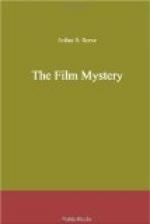I had wondered, as Kennedy and I occupied a seat in the train, and as he left me to my thoughts, whether there could be any connection between the tragedy and the divorce. The decree, I knew, was not yet final. Could it be possible that Millard was unwilling, after all, to surrender her? Could he prefer deliberate murder to granting her her freedom? I was compelled to drop that line of thought, since it offered no explanation of his previous failure to contest her suit or to start counter action.
Then my reflections had strayed away from Kennedy’s sphere, the solving of the mystery, to my own, the news value of her death and the events following. The Star, as always, had been only too glad to assign me to any case where Craig Kennedy was concerned; my phone message to the city editor, the first intimation to any New York paper of Stella’s death, already had resulted without doubt in scare heads and an extra edition.
The thought of the prominence given the personal affairs of picture players and theatrical folk had disgusted me.
There are stars against whom there is not the slightest breath of gossip, even among the studio scandal-mongers. Any number of girls and men go about their work sanely and seriously, concerned in nothing but their success and the pursuit of normal pleasures. As a matter of fact it had struck me on the train that this was about the first time Craig Kennedy had ever been called in upon a case even remotely connected with the picture field. I knew he would be confronted with a tangled skein of idle talk, from everybody, about everybody, and mostly without justification. I hoped he would not fall into the popular error of assuming all film players bad, all studios schools of immorality. I was glad I was able to accompany him on that account.
The arrival at Tarrytown had ended my reflections, and Kennedy’s —whatever they may have been. Mackay himself had met us at the station and with a few words, to cover his nervousness, had whisked us out to the house.
As we approached, Kennedy had taken quick note of the surroundings, the location of the home itself, the arrangement of the grounds. There was a spreading lawn on all four sides, unbroken by plant or bush or tree—sheer prodigality of space, the better to display a rambling but most artistic pile of gray granite. Masking the road and the adjoining grounds was thick, impenetrable shrubbery, a ring of miniature forest land about the estate. There was a garage, set back, and tennis courts, and a practice golf green. In the center of a garden in a far corner a summerhouse was placed so as to reflect itself in the surface of a glistening swimming pool.
As we pulled up under the porte-cochere Emery Phelps, the banker, greeted us. Perhaps it was my imagination, but it seemed to me that there was a repressed animosity in his manner, as though he resented the intrusion of Kennedy and myself, yet felt powerless to prevent it. In contrast to his manner was the cordiality of Lloyd Manton, just inside the door. Manton was childishly eager in his welcome, so much so that I was able to detect a shade of suspicion in Kennedy’s face.




